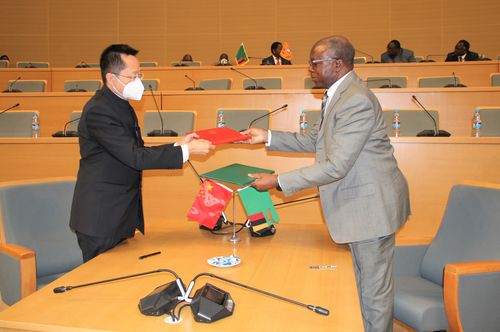In 2023, Zambia faced a transformative year defined by numerous challenges, spanning from the effects of climate change to the complex negotiations entwined with a cumbersome debt restructuring agreement.
The country made history as thefirst African country to default on its debt during the COVID-19 era, setting the tone for the entire year. The complex dynamics of this situation were underscored by China’s role, serving as Zambia’s largest Official Creditor and a key investor, solidifying its influence in the country’s 2023 debt talks. Consequently, China became a focal point in media discussions, particularly in analyses concerning Zambia’s economic development.
Unpacking 2023
President Hakainde Hichilema’s optimistic outlook for Zambia in 2023, outlined in the state-run Zambia Daily Mail, focused on unlocking local economic rigidities and redirecting public institutions toward citizen-centric service delivery. Aligned with the president’s vision, the primary emphasis during the year persisted on alleviating the burden of debt distress, identified as a major challenge to the country’s economic progress.
The year’s trajectory began with a news piece by The Africa Report highlighting President Hichilema’s intent to reset Zambia’s relations with China, sparking discussions on the implications of such a recalibration.
On 24th January, 2023, the Daily Nation of Kenya ran a headline Zambia’s debt relief a ‘top priority’ for US, says Janet Yellen for a story of the visit of U.S. Treasury Secretary to Zambia. The story which stirred speculation also set the stage for the looming debt talks throughout 2023. Meanwhile, News Diggers provided insights during the visit of U.S. Treasury Secretary, quoting Zambia’s Minister of Finance and National Planning Situmbeko Musokotwane, expressing the government’s intent to “Promote self-reliance and reduce on issue of begging.”
Elsewhere, the AP News, ran a headline: Yellen pushes for China to address Zambia’s big debt burden, while the Wall Street Journal headline was Janet Yellen Pushes China on Debt Relief for Zambia. Both stories emphasised the urgency of addressing Zambia’s substantial debt burden, reporting on the US envoy’s efforts to press China on debt relief for Zambia, thus advancing the discourse on China’s role in the delayed debt restructuring.
Yellen’s statements provoked a swift response from the Chinese Embassy in Zambia. Lusaka Times, reporting on China’s reaction to Yellen, ran the headline: “China slams U.S. for sabotaging Zambia’s debt talks…,” turning the blame on the U.S., and urging the Western country to focus on its own financial issues.
Extensive media coverage persisted from February to May, with the Financial Times shedding light on Musokotwane’s distress over prolonged debt restructuring, countered by Global Times emphasising China’s commitment to constructively supporting the process.
March 2023 brought forth a thought-provoking headline from Lusaka Times: “USA seems to undervalue China’s role in Zambian economy: Here is how deep the ties are.” The article not only delved into the perceived underrating, but also presented potential avenues for China to expedite debt restructuring talks, unravelling the complex relations between Zambia and China.
As April and May unfolded, Reuters communicated Zambia’s intention to dispatch a comprehensive debt restructuring plan to China and other government creditors, leveraging newfound momentum from high-level talks. The Wall Street Journal underscored President Hichilema’s warning about the adverse effects of the debt standoff between China and the US on impoverished countries.
Within local media, Lusaka Times pinpointed the prolonged delay in finalising the debt restructuring deal, attributing it to geopolitical rivalry between China and the U.S. Despite the intricacies, a sense of relief permeated as the news site reported that the U.S. and China seemed to collaborate in supporting Zambia’s interests, particularly in anti-corruption measures, economic strengthening, and the on-going debt restructuring talks.
Adding a critical perspective, the BBC incorporated the sentiments of outgoing World Bank President David Malpass, expressing reservations about the lack of transparency in trade relations with China. In this story, Malpass advocated for heightened transparency in international financial support, especially given the potential long-term implications of Chinese loans to Africa.
June brought a glimmer of hope as the Zambian government announced a comprehensive debt treatment agreement with its Official Creditors under the G20 Common Framework, a mechanism introduced to facilitate orderly and timely debt treatment for low-income countries. The terms of the agreed treatment would be further described and formalised in a Memorandum of Understanding between Zambia and Official Creditors, which would then be implemented through bilateral agreements with each member of the Official Creditor Committee.
Anticipations then arose during Zambian President Hakainde Hichilema’s state visit to China in September, with news sites and prominent politicians suggesting it would be an opportunity for Zambia to get China to write off some of its debt.
Bloomberg’s report announced a positive development: “Zambia, China agree to increase use of local currency in trade.” Nonetheless noting: “However, scant details emerged regarding talks to finalise the substantial $6.3 billion debt revamp.”
This positive stride, however, was marred by the surprising omission of debt talks during the state visit. Asia-Pacific Magazine, The Diplomat dismissed these expectations of debt talks, suggesting a pivot towards growth rather than addressing the pressing debt burden. Yet, one cannot ignore the interconnectedness of debt and growth; discussing the former is crucial to strengthening bilateral relations and ensuring Zambia’s long-term sustainability.
As the year concluded, positive and negative reports in the media reports reflected China’s expanding influence in Zambia, particularly in the aftermath of President Hichilema’s state visit. For example, Voice of America reported concerns about Chinese dominance in the Zambian market, prompting reflections on economic fairness and competition.
2023 closed with a dramatic twist of media reports about the resignation of Zambia’s Foreign Affairs Minister Stanley Kakubo. A cryptic video of an allegedly bribery scandal involving Kakubo and a Chinese firm caused a social media buzz in December. The reports not only raised concerns about corruption within the Zambian government, but also the nature of the relations between Zambia and China.
Where media stood
Throughout the events of 2023, a notable contrast emerged between the tone of media from the Zambian side and their international counterparts.
Apart from not widely covering the debt restructuring issues as compared to international media, Zambian news sites appeared to have adopted a measured and neutral stance, refraining from overtly criticising China’s role in debt restructuring negotiations. For example, Lusaka Times and News Diggers seemed hesitant to delve too deeply into the potential drawbacks of Zambia’s relations with China. Reports often parroted statements from officials and events without carefully questioning or scrutinising the actions and influence of China in debt talks.
In contrast, international media outlets such as AP News, Wall Street Journal, the BBC, and Financial Times provided more critical perspectives, emphasising the urgency of addressing Zambia’s debt burden. Even some regional media delved into geopolitical implications and raised questions about China’s influence surrounding Zambia’s economic and diplomatic challenges. However, Asian media seemed to defend China’s role in Zambia’s debt talks.
Nevertheless, the lukewarm approach in local media reports may have been influenced by diplomatic considerations, economic ties, and a desire to maintain a stable relationship with China, a major investor and creditor. The government’s emphasis on diplomatic language and avoiding direct confrontation may have also contributed to the more reserved tone towards China in the media.
While state actors persistently portrayed China as an all-weather friend, this narrative failed to resonate with a frustrated citizenry. The ongoing debt restructuring process is important for Zambia, representing a critical step towards regaining financial stability, fostering sustainable growth, and safeguarding the interests of its citizens. Therefore, the perplexing aspect remains the reasons for the delay on China’s part, as it simultaneously expand its footprint in the country to minor scrutiny from the media.
Certainly, one can view China’s increasing influence in Zambia through a lens that considers the intricate dynamics of power play and resource leverage. The delayed agreement on Zambia’s debt restructuring agreement, attributed to its largest official creditor – China, raises questions about the underlying motivations and the potential leverage China holds over Zambia, particularly in the realm of valuable resources like copper.
As investment and development flow into Zambia from its largest creditors, the nation grapples with the looming spectre of increased external influence. The worry is palpable – economic prosperity may come at the cost of surrendering control to foreign powers. Striking a balance between economic cooperation and safeguarding national interests remains an imperative task for Zambia as it navigates the intricate web of relations with China in the years ahead. Moreover, the role of the media in setting the agenda – scrutinising what certain relations mean for Zambia – becomes increasingly important.
Basil Hamusokwe is a Research Fellow at the Public Policy Research Institute of Zimbabwe

Discover more from MAKANDAY
Subscribe to get the latest posts sent to your email.



